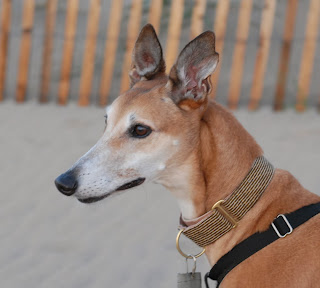+cropped.jpg) |
| Taylor now lives in Florida with an adopted family. |
Greyhound advocates
won two major victories yesterday in
West Virginia. First, the state Racing Commission unanimously voted to
approve a new animal cruelty policy. Thanks to this vote, it will now be the Commission's
official policy to report instances of animal cruelty, mistreatment, neglect, abuse or abandonment to the appropriate local law enforcement authorities.
The Commission also voted,
again unanimously, to refer a case involving two greyhound trainers to Ohio County Prosecuting Attorney
Scott Smith. The trainers had been previously disciplined by the Commission after they
failed to provide an injured greyhound with veterinary care.
Before voting on the animal cruelty policy, the Commission acknowledged that they had received
many supportive comments from humane minded citizens, including
GREY2K USA supporters. We are grateful to everyone who helped give the greyhounds a voice.
The
three members of the West Virginia Racing Commission should also be applauded for their compassionate votes. Their actions send a clear message that greyhound cruelty will not be tolerated, and abusers will be held accountable. We are also thankful for the work of Commission
Executive Director Jon Amores, who helped draft the policy. Please send a
polite message to the Commission,
thanking them for adopting this new animal cruelty policy.
Finally, it should be noted that greyhound breeders
fought to weaken the animal cruelty policy until the bitter end. According to the
Charleston Daily Mail:
"The state Racing Commission unanimously approved the agency's first animal cruelty policy Tuesday. In doing so, it declined to accept several changes pushed for by the West Virginia Greyhound Owners and Breeders Association."
The Daily Mail also interviewed West Virginia Greyhound Owners and Breeders Association President Sam Burdette, who offered a
strange commentary on the Commission proposal:
"I think that cruelty is a very relative, subjective subject ... they should have adopted something that lets people understand that dogs need discipline, that they don't need to be treated cruel in fits of rage or temper or anger."
According to the Daily Mail Burdette then described a hypothetical greyhound trainer and dog fight, using terms like "
fangs ripping" and "
going for the throat," and claimed that to break up the fight:
"He may have to pick up a dog and throw it."
 |
| Dog racing industry spokesman Sam Burdette |
This is not the first time Burdette has expressed
bizarre views on greyhound cruelty. Just last month, he told Pittsburgh television news station WTAE that he could "
understand" why a greyhound trainer had hit several greyhounds. He went on to say that although the trainer had acted "
a little bit rough ... that's the way you handle dogs and the only way you can handle dogs."
This
rationalization of greyhound cruelty goes against the views most West Virginia citizens have about animal cruelty. Like Burdette the greyhound industry is
out of touch, an anachronism from a
bygone era when people held very different views on animal welfare.
We should not, however, allow this
callous industry perspective to overshadow the important victory that occurred yesterday in
West Virginia. Thanks to the
State Racing Commission, greyhounds now have an added layer of protection from individuals who would do them harm.


+cropped.jpg)





+cropped.jpg)


